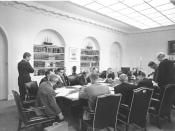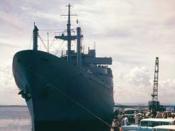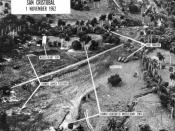The Cuban Missile Crisis: Necessary or Not? "?Above all, while defending our own vital interests, nuclear powers must avert those confrontations which bring an adversary to a choice of either a humiliating retreat or a nuclear war. To adopt that kind of course in the nuclear age would be evidence only of the bankruptcy of our policy- -or of a collective death-wish for the world" (Walton 142). -President John F.
Kennedy Although it is regarded as a highlight of President John F. Kennedy's career, the Cuban Missile Crisis may not have been the heroic act it appeared. Contrary to his own statement as quoted above, his choices in dealing with Khruschev and the Communist threat in Cuba put the world in extreme risk by forcing Moscow to choose only total surrender or total war. Due to fear, mistrust, and the desire to show political strength, JFK brought the Untied States and the world as close as it has ever been to global catastrophe.
War was avoided, but there is room for doubt that this dangerous gamble was necessary to create peace. On April 17, 1961, an invasion force comprised of anti-Castro Cubans, who had been trained by the United States government, landed on the shores of the Bay of Pigs in Cuba. The intent was to overthrow Fidel Castro and implement a more U.S.-friendly government, but the force was crushed in an embarrassing defeat. This left the world stunned. How could President Kennedy allow such a thing to happen? It marked the first of many events that led to the Cuban missile crisis, which occurred over a year later. The Bay of Pigs incident broke all of the little trust that the Cubans had left I the United States, and ignited the support of Castro by the Soviet Union.


